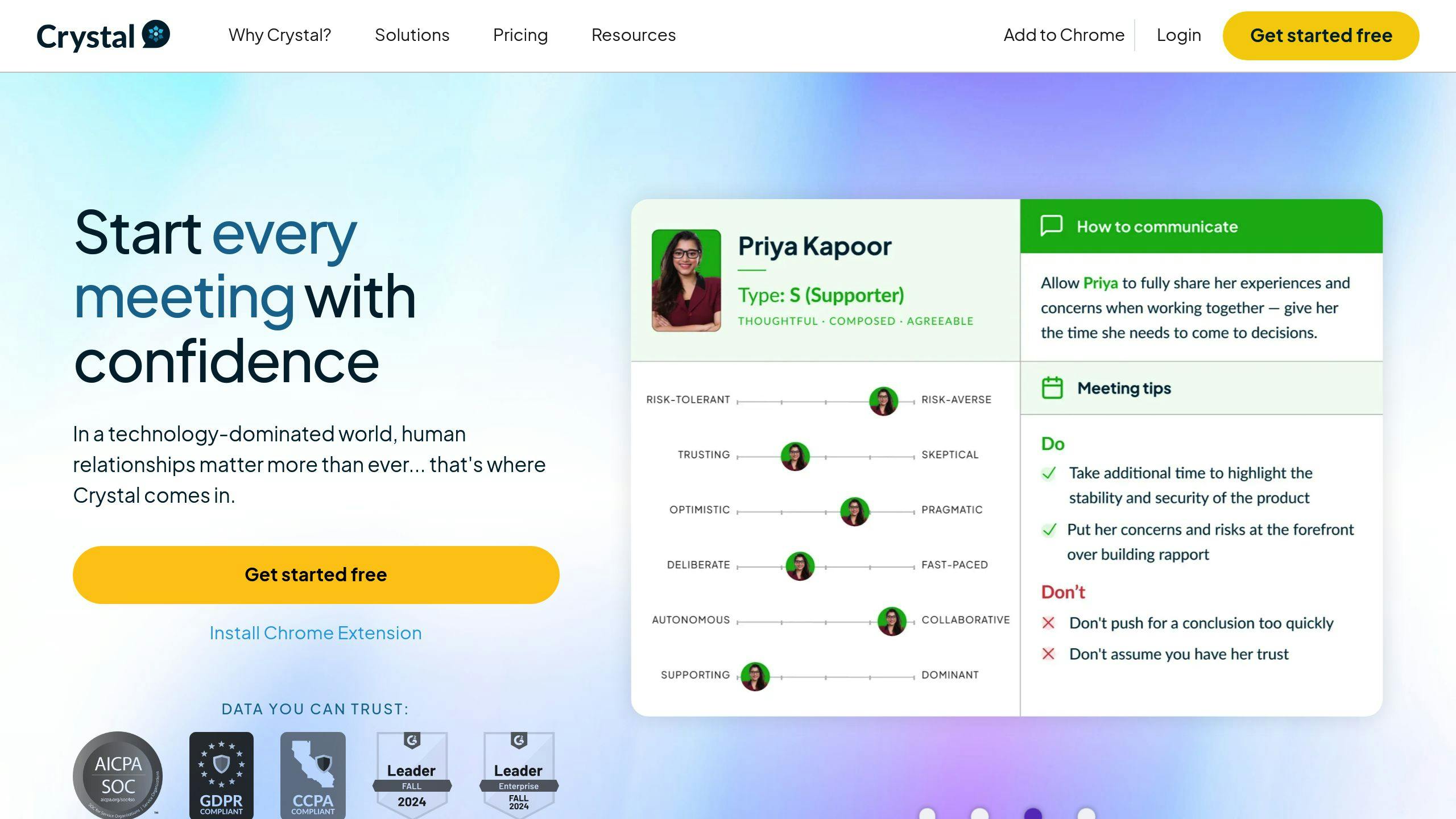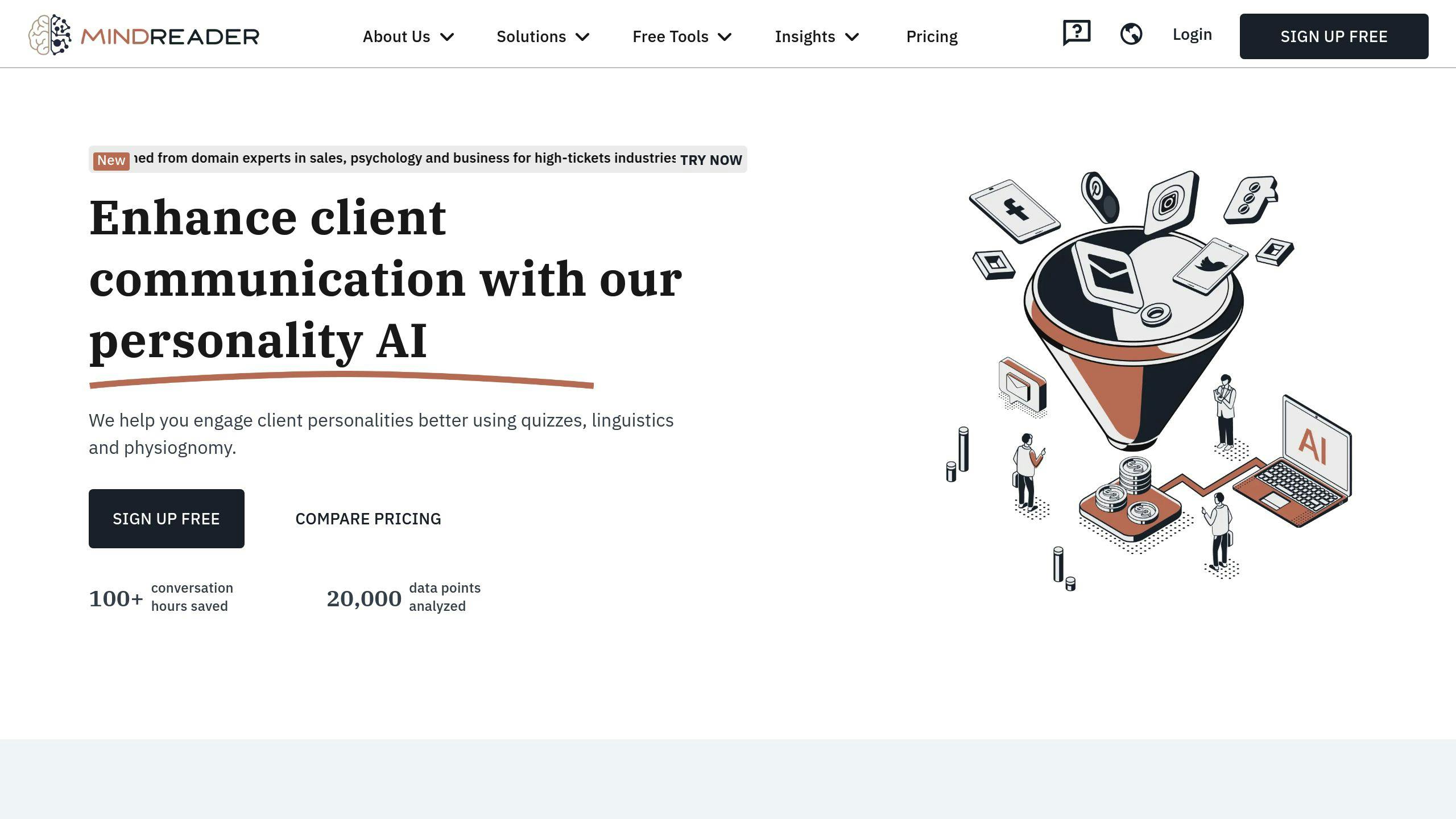Tailoring your sales approach to fit a client's personality can improve communication, build stronger relationships, and increase conversions. Here's how you can start:
- Use Personality Frameworks: Tools like DISC and Big 5 help identify traits like analytical thinking or relationship focus.
- Leverage AI Tools: Platforms like Crystal ($49/month) and Mindreader analyze communication patterns to provide personality insights.
- Adapt Your Style: Match your communication to personality types - use data for analytical clients or share stories with relationship-oriented ones.
- Combine AI with Observation: AI tools are helpful, but active listening and reading non-verbal cues are equally important.
- Integrate AI Into Workflows: Sync AI tools with your CRM for real-time insights, better email open rates, and improved client engagement.
Quick Tip: Analytical clients prefer data, while relationship-focused clients value personal stories. Adjust your pitch accordingly.
| Personality Type | Communication Style | Focus Areas |
|---|---|---|
| Analytical | Logical, data-driven | Stats, ROI, research-backed claims |
| Relationship-Oriented | Warm, collaborative | Personal stories, long-term partnerships |
| Results-Driven | Direct, efficient | Bottom-line impact, quick wins |
| Detail-Oriented | Systematic, thorough | Step-by-step processes, documentation |
AI tools like Crystal and Mindreader make personalization easier, but human intuition is still key. By blending tech with personal expertise, you can create meaningful, effective sales strategies.
The Adaptive Selling Platform - Crystal Knows

Identifying Client Personality Types
Getting a handle on client personalities is a game-changer for sales. With the help of modern tools, combining traditional frameworks with AI-driven solutions gives sales professionals a deeper understanding of their clients' preferences and behaviors.
Common Personality Frameworks
The DISC framework - Dominance, Influence, Steadiness, and Conscientiousness - is a popular choice for quick client profiling. Its straightforward structure makes it ideal for sales scenarios, especially when paired with AI tools for faster insights. On the other hand, the Big 5 framework offers a more detailed approach, making it better suited for building long-term relationships [1][3].
AI Tools for Personality Profiling
AI-powered tools like Crystal Knows (priced at $49/month) and Mindreader's Sales Smart chatbot take personality profiling to the next level. These tools analyze communication patterns - such as tone, word choice, and even body language - using frameworks like DISC or customized profiling systems. By blending traditional frameworks with real-time, data-driven insights, these tools provide a sharper understanding of client personalities and help craft tailored sales strategies [2].
Observation Techniques
While AI tools are incredibly useful, they work best when paired with human observation. Paying attention to how clients communicate can reveal critical personality traits. Focus on these key areas:
- Active Listening: Pay attention to their word choice, speaking speed, and level of enthusiasm.
- Non-Verbal Cues: Watch for gestures, posture, and facial expressions.
- Preference Awareness: Notice if they lean toward detailed explanations or prefer a quick summary.
For example, an AI tool might suggest that a client is highly analytical. However, observing their reaction to detailed data during a presentation can confirm or tweak that assessment [1][3]. Think of AI as a guide - it gives you a starting point, but your adaptability in real-time interactions is what seals the deal.
Once you’ve nailed down a client’s personality type, you can fine-tune your communication and sales approach to match their preferences seamlessly.
Tailoring Sales Strategies
Once you've identified your client's personality type, the next step is refining your approach to make a stronger impact. Today's sales professionals combine tried-and-true communication methods with AI-driven insights to craft highly personalized strategies.
Adjusting Communication Styles
Blending tools like DISC or Big 5 frameworks with AI insights helps align your sales strategy with both psychological principles and data-backed recommendations. Different personality types require tailored communication methods:
| Personality Type | Communication Style | Key Focus Areas |
|---|---|---|
| Analytical | Logical, data-driven | Focus on detailed statistics, ROI insights, and research-backed claims. Avoid emotional appeals or rushing decisions. |
| Relationship-oriented | Warm, collaborative | Highlight personal stories, team benefits, and long-term partnerships. Maintain a personal connection. |
| Results-driven | Direct, efficient | Emphasize bottom-line impact, quick wins, and competitive advantages. Keep small talk to a minimum. |
| Detail-oriented | Systematic, thorough | Provide step-by-step processes and thorough documentation. Ensure every detail is covered. |
For instance, when working with an analytical client, lead with hard data: "Our solution increased efficiency by 27% across 150 companies in Q4 2024." On the other hand, for a relationship-focused client, share collaborative success stories and emphasize shared values.
Using AI for Personalized Engagement
AI tools have revolutionized sales by making real-time personalization possible. Platforms like Mindreader's Sales Smart chatbot analyze client communication patterns and offer instant suggestions for engagement. Their proprietary framework categorizes personalities into types like Knights (focused on structure), Explorers (driven by creativity), Healers (relationship-focused), and Wizards (strategic thinkers). This allows for tailored communication and persuasion strategies.
Another tool, Crystal, delivers actionable insights into client personalities, helping you fine-tune your messaging. These AI tools are most effective when paired with human observation and intuition. While AI provides valuable data, your ability to adapt in real-time is what truly drives success.
"Psychology tells us that personality traits significantly influence decision-making. Understanding your prospect's personality can give you valuable insights into their buying style, allowing you to tailor your message and approach accordingly." - The Center for Sales Strategy, 2024 [1]
Once you've mastered adapting communication styles, it's time to weave these AI-driven insights into your broader sales process for even better results.
Integrating AI in Sales
Let’s dive into how AI tools can take personalized client interactions to the next level, building on your existing communication strategies.
Case Study: Mindreader

Mindreader’s Sales Smart chatbot analyzes facial expressions and text to classify clients into four personality types - Knights, Explorers, Healers, and Wizards. This helps sales teams adjust their approach on the spot. The results? A 20% boost in client engagement within just three months. For instance, when the system identifies a "Knight" personality, it suggests sales scripts that focus on structure and reliability, leading to better conversion rates.
AI Integration in Sales Processes
To make AI work seamlessly with your sales process, you need a plan that blends technology with your current workflows. Here's a breakdown of how to use AI-powered personality profiling effectively:
| Integration Phase | Key Actions | Expected Outcomes |
|---|---|---|
| Initial Setup | Link AI tools to your CRM, Import client history | Create accurate personality profiles |
| Ongoing Operations | Analyze interactions in real-time, Generate custom templates, Track metrics, Fine-tune AI models | Higher email open rates (15%), Better meeting conversions (25%), Improved profiling accuracy |
Take Crystal’s platform as an example. By connecting directly to CRM systems, it delivers instant personality insights during live client interactions. To get the most out of AI integration, focus on these key areas:
- Data Quality: Keep your CRM data clean and well-organized for precise AI analysis.
- Team Training: Train your team to interpret and apply AI-generated insights effectively.
- Process Integration: Make AI suggestions a regular part of your sales routine.
- Performance Tracking: Use clear metrics to measure how well AI-driven personalization works.
While AI offers powerful tools for understanding clients, the human touch remains irreplaceable. Building strong relationships and reading social cues are skills that machines can’t fully replicate. Combining AI insights with your personal expertise ensures your team stays ahead in today’s highly personalized sales landscape.
Conclusion and Key Points
Summary of Best Practices
Sales strategies built around understanding personalities have taken a leap forward with AI tools. By combining human judgment with advanced technology, sales teams can now operate with a mix of intuition and data-driven precision. This guide has shown how AI enhances traditional methods, making personalization faster and more accurate.
Here’s a quick comparison of how AI has reshaped key aspects of personality-based sales:
| Component | Traditional Approach | AI-Enhanced Approach |
|---|---|---|
| Profiling & Communication | Observations and generic scripts | Insights powered by AI for real-time tailoring |
| Response Speed | Gradual adjustments | Instant, data-informed reactions |
Future Trends in AI Sales
Looking ahead, AI tools are set to push the boundaries of personalized sales even further. Some emerging developments to watch include:
- Improved Personality Detection: AI is getting better at picking up subtle personality cues from various communication methods.
- Seamless Integration: These tools are becoming a natural part of sales workflows, syncing effortlessly with CRMs and other platforms.
- Learning from Results: AI systems are starting to refine personality insights based on actual sales outcomes.
To keep up, sales professionals should focus on sharpening two key skills: emotional intelligence and mastery of AI tools. This combination allows them to use technology effectively without losing the human connection that’s vital for building trust and loyalty.
AI tools are there to assist, not replace. The real winners in sales will be those who can balance cutting-edge tech with genuine relationships.
FAQs
Here are answers to some common questions about using personality-based sales strategies and AI tools.
How to sell to an analytical personality?
When dealing with analytical personalities, focus on providing clear, well-organized information. Here's how you can tailor your approach:
| Key Aspect | Recommended Approach |
|---|---|
| Communication & Materials | Use data-heavy presentations, charts, statistics, and documented proof. |
| Meeting Structure | Stick to a structured agenda with clear goals and objectives. |
| Decision Process | Give them enough time for detailed analysis and careful consideration. |
Crystal Knows highlights that analytical buyers value professionalism, structure, and dependability. Using AI tools can simplify the process of identifying these traits, helping you craft a more precise and effective sales strategy.
What is the AI tool for personality?
Crystal Knows is a prominent AI-powered platform for personality assessment. It uses advanced technology to provide instant insights, helping you tailor your communication for better results. Key features include:
- Real-time personality predictions based on online profiles.
- Customized communication tips for different personality types.
- Seamless integration with popular CRM platforms.
"Crystal Knows uses AI and machine learning to predict anyone's personality. The platform uses the DISC assessment to profile personalities based on their online footprint, specifically through social media profiles and other public data" [2].




